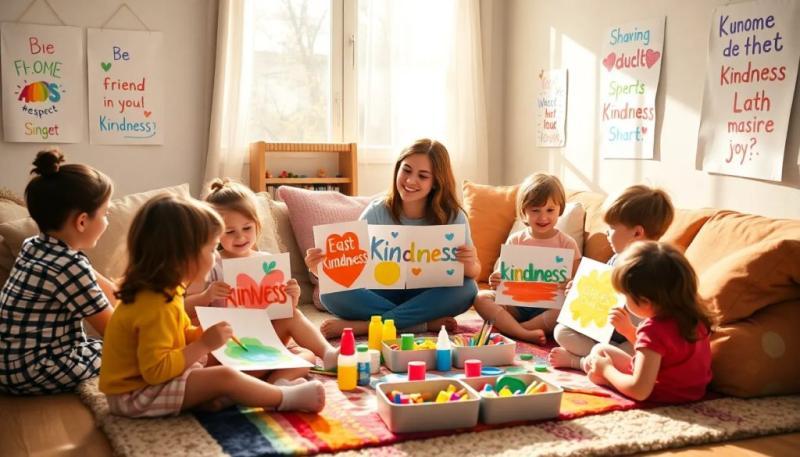In today's fast-paced world, the role of a babysitter extends beyond mere supervision; they act as vital mentors in a child’s upbringing. A significant aspect of their influence is in teaching kindness and respect. Through their interactions with children, babysitters can foster an environment that cultivates these essential values.
Understanding how babysitters encourage kindness and respect can help parents choose the right caregiver for their children. By emphasizing the qualities and practices that promote a positive atmosphere, we can ensure that the next generation grows up with strong moral foundations.
What are the key qualities of a good babysitter?
A good babysitter embodies various qualities that contribute to their effectiveness. These include responsibility, patience, and a genuine love for children. In essence, they become a positive role model who shapes children’s behavior.
Moreover, being dependable allows children to feel secure, which is crucial in building trust. They should also possess strong communication skills to articulate expectations and establish boundaries. This dual focus on kindness and effective communication lays the groundwork for a nurturing environment.
- Responsibility: Always ready to handle emergencies.
- Empathy: Understanding children’s feelings.
- Creativity: Making activities engaging.
- Patience: Handling challenging situations gracefully.
Ultimately, these qualities help babysitters create a safe and welcoming space for children to learn kindness and respect through daily interactions.
How can babysitters foster a positive environment?
Creating a positive environment is fundamental for any babysitter. They can initiate this by cultivating an atmosphere where children feel valued and heard. Implementing daily rituals, such as sharing highlights of the day, encourages open communication.
Moreover, babysitters can incorporate games and activities that promote teamwork and collaboration. This engagement teaches children the importance of working together and respecting one another's contributions. For example, group activities like cooking or arts and crafts can highlight the significance of sharing and cooperation.
- Encouraging open dialogue to express feelings.
- Creating fun, inclusive games that require teamwork.
- Recognizing individual contributions during activities.
Through these practices, babysitters create a supportive atmosphere that allows children to practice kindness in their interactions.
What role does communication play in babysitting?
Effective communication is the backbone of a successful babysitting experience. It allows babysitters to convey expectations clearly and fosters a relationship built on trust. When children understand the importance of expressing their thoughts and emotions, they learn to respect others.
Babysitters can model good communication by using active listening techniques. This approach not only validates children’s feelings but also encourages them to articulate their own thoughts respectfully. By demonstrating how to engage in a constructive dialogue, babysitters guide children in developing their communication skills.
Additionally, creating a family meeting structure where children can voice their concerns can further enhance this communication dynamic. This practice teaches children that their opinions matter and promotes mutual respect among peers.
How can babysitters teach kindness to children?
Teaching kindness is a vital responsibility for babysitters. One effective method is through daily examples. When babysitters model kind behavior, children are more likely to mimic those actions. Simple gestures, like saying "please" and "thank you," can leave a lasting impression.
Incorporating discussions about kindness into everyday conversations can also be beneficial. Babysitters can engage children in storytelling that emphasizes the importance of empathy and compassion. This approach helps children understand the impact of their actions on others.
- Model kind behavior consistently.
- Use books and stories that highlight acts of kindness.
- Encourage children to perform small acts of kindness daily.
Through these strategies, babysitters actively instill the value of kindness in children, equipping them with the tools to foster positive relationships.
What are effective ways to build trust with your babysitter?
Building trust between parents and babysitters is essential for a successful caregiving relationship. Parents should conduct thorough interviews to ensure they are selecting the right babysitter who aligns with their values. Providing clear guidelines on behavior expectations can also facilitate this trust.
Regular check-ins can help maintain open lines of communication. Parents can ask for feedback on how their children are responding to different activities or routines, allowing for ongoing adjustments. This collaborative approach fosters a sense of partnership, enhancing the relationship.
Additionally, parents should express appreciation for the babysitter's efforts. Simple acknowledgments can go a long way in establishing a trusting bond.
How to establish boundaries with your babysitter?
Setting clear boundaries is crucial in a babysitting relationship. Parents should outline expectations regarding discipline, screen time, and household rules. This clarity helps prevent misunderstandings and ensures that everyone is on the same page.
Additionally, parents should encourage babysitters to communicate any issues or concerns they encounter. This dynamic promotes a healthy dialogue, enabling adjustments to be made proactively.
Ultimately, establishing boundaries creates a framework for respect, allowing for a productive and harmonious relationship.
Questions related to how babysitters encourage kindness and respect
What are the three biggest responsibilities of a babysitter?
The three biggest responsibilities of a babysitter include ensuring the safety of the child, providing engaging activities, and promoting emotional well-being. Safety is paramount; babysitters must be vigilant in monitoring their surroundings and the child's actions. They should also create an engaging atmosphere, utilizing activities that capture children's interests. Lastly, fostering emotional well-being involves supporting children’s feelings and helping them express emotions constructively.
How to show kindness and respect in school?
Showing kindness and respect in school can be achieved through simple actions like greeting classmates, offering help, and listening attentively. Encouraging collaboration during group projects fosters teamwork and accountability. Additionally, participating in community service or school initiatives promotes a culture of kindness, allowing students to feel their contributions make a difference.
What qualities does a good babysitter possess?
A good babysitter should possess qualities such as patience, responsibility, creativity, and adaptability. Patience is essential for handling various challenges that may arise with children. Responsibility ensures that the caregiver can manage safety and emergencies effectively. Creativity helps in keeping children engaged, while adaptability allows the babysitter to respond to the unique needs of each child.
What skills can babysitting teach you?
Babysitting can teach valuable skills such as leadership, effective communication, and conflict resolution. As babysitters manage kids and facilitate activities, they develop leadership qualities. Effective communication is vital for conveying instructions and understanding children’s needs. Additionally, babysitting often involves resolving conflicts, honing skills in negotiation and problem-solving.


